Tokyo Olympics 2021: Aussies ready to unleash awesome foursome on the world
In the same Japanese city where Dawn Fraser secured her place in sporting immortality, four swimmers have set their sights on the most ambitious goal in Australian Olympic history.
Olympics
Don't miss out on the headlines from Olympics. Followed categories will be added to My News.
They’re fit, fast and fearless.
Swim stars Ariarne Titmus, Kaylee McKeown, Cate Campbell and Emma McKeon will lead a new dawn of Australian Olympic success from the land of the rising sun.
In the same Japanese city where Dawn Fraser secured her place in sporting immortality more than half a century ago, the awesome foursome have set their sights on the most ambitious goal in Australian Olympic history.
Kayo is your ticket to the best local and international sport streaming Live & On-Demand. New to Kayo? Try 14-days free now >
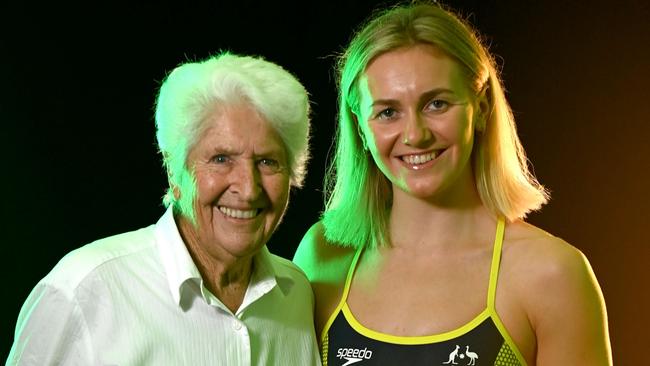
Less rebellious than Fraser, but no less talented or determined, their mission is to spearhead Australia’s biggest gold rush at any Olympics.
That means surpassing the 17 gold medals Australia won at the 2004 Athens Olympics but the four zoomers are capable of contributing half the required number themselves.
That’s nine golds between them, more than any entire Australian swim team has won at a single Olympics, but this is no far-fetched fantasy.
Titmus is ranked number one in the world in 200m freestyle and 400m freestyle while McKeown is ranked No. 1 in 100m backstroke and 200m backstroke.
McKeon and Campbell occupy the top two spots in the 50m freestyle and 100m freestyle and are teammates on relays, two of which Australia are considered certainties to win.
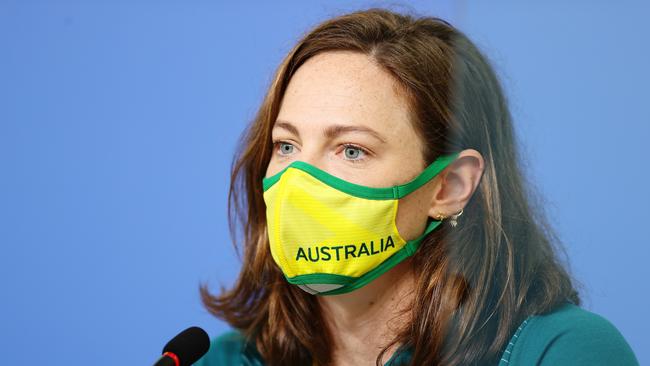
It’s not the Aussie way to make any brash predictions – especially after the swim team’s disappointing return from the last two Olympics – but there’s an unmistakeable air of confidence about the current Dolphins’ squad that has won the royal seal of approval from Fraser herself.
“The competition is what it‘s all about but you can tell they’re looking forward to that competition, which is very important,” Fraser said.
“They not only have to be physically fit but also mentally fit, so that when they go up against those other big names, that’s not going to affect their mind.
“All they want to worry about is what’s happening in their own lane and that’s the message I keep telling them.”
Fraser also followed her own words with actions, defying the odds, and the tragic death of her mother in a car crash, to win the 100m freestyle final at the 1964 Tokyo Olympics.
In doing so, Fraser became the first swimmer to win gold medals at three Olympics, though her historic feat has always been partially overshadowed because she got busted pinching a souvenir flag from the emperor’s palace, which she was later allowed to keep and still has to this day.
Fifty-seven years later, Fraser has been prevented from returning to the scene of her greatest triumph because of the international travel restrictions, but Australia’s new golden girls have all invoked her sense of daring.
Swimmers rarely march at Olympic Opening Ceremonies because they often have to compete the next day but Fraser broke with convention in 1964 and joined the parade, then duly won gold and was given the honour of carrying the Australian flag at the Closing Ceremony.
Libby Trickett is the only other Australian swimmer to win gold medals at three Olympics but Campbell has the chance to join them, so she thought long and hard about whether she would accept the offer of carrying the flag at this year’s Opening Ceremony.
She knows Fraser’s story by chapter and verse, so she agreed and fittingly, it was the living legend herself who presented Campbell with the flag she will carry into the stadium.
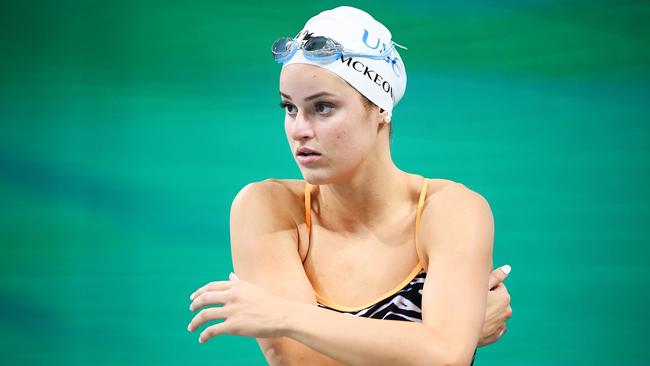
“Performance always comes first. That is a non-negotiable for me,” Campbell said.
“But I actually think that my performance will benefit from this.
“To be able to go out and feel the sense of community behind me when you compete under Australian flag will only fuel me for the week ahead. I really feel like this is going to be a performance bonus for me.”
Australia has no end of inspiring gold medal hopefuls in Tokyo, including Wimbledon champion Ash Barty and NBA point guard Patty Mills, but few will capture the hearts of the nation more than our leading swimmers and their courageous stories of hope.
The oldest member of the swim team, Campbell, 29, almost quit the sport after she was branded a choker and attacked by online trolls after being beaten in her individual events at the 2016 Rio Olympics.
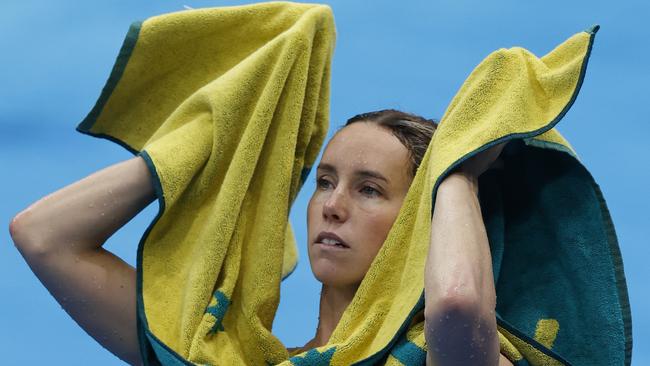
McKeown, one of the youngest members of the swim team, lost her father to brain cancer last year. Just 20, she has a perspective that goes way beyond swimming that Australians understand.
There won’t be a dry eye in any Australian household if McKeown wins gold in Tokyo because she represents the enduring hope that we all have in a world turned upside down by the pandemic.
“I have turned into a bit of a hunger and motivation behind me,” McKeown said.
“I use it every day that I wake up because I know it‘s a privilege to be on this earth and walk and talk.”
Bronte Campbell drops huge Paris hint
Australia’s fastest female swimmers have been racing against each other since they were 12 years old – now they will line up together in an effort to win their third straight Olympic gold medal, and possibly Bronte Campbell’s last.
Campbell, 27, made her Games debut in 2012 and won gold at the 2016 Rio Games.
But she has hinted she won’t be competing in Paris.
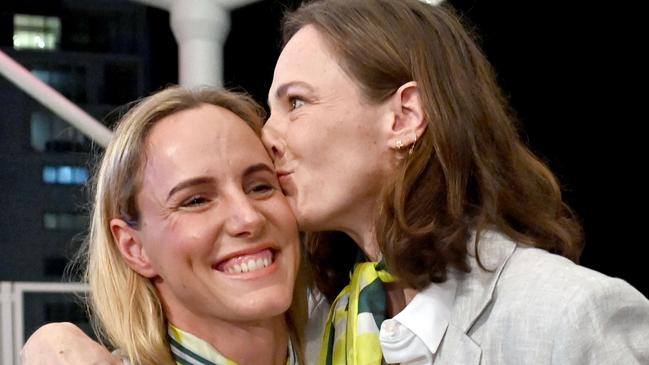
The Aussie women finished on top of the podium in the 4x100m relay in 2012 and 2016 and Campbell said there is no reason why they can’t do it again.
“It is what I most look forward to, it is always on the first night and I can’t wait to be part of it again,” Campbell said.
“It is an honour to carry the baton forward.”
The final line-up for the relay is yet to be determined but Campbell could line up alongside her sister Cate, Emma McKeon, Madi Wilson, Meg Harris or Mollie O’Callaghan.
“Cate has been a staple of the team. But I’ve raced with the other girls since I was 12-years-old,” Campbell said.
“You become a family and you really want to do it for your sisters on either side of you.”
Campbell wasn’t willing to make predictions on how the team would go but did say she was feeling confident.
“On paper is one thing but in the lights of the arena is a totally different thing,” Campbell said.
“I don’t think lots of countries have shown their best yet which will make for an exciting race.
“I’m really confident we have a really good team.”
Campbell has had a successful swimming career, with her most recent achievements including three gold medals at the 2018 Commonwealth Games and two gold and a silver at the 2019 World Championships.
She hasn’t ruled out competing after Tokyo but hinted she would hang her cap up by the 2024 Paris Games, not quite willing to commit to another three years of training.
“I’m still figuring it out,” Campbell said.
“I’m focused on Tokyo and will make all decisions after that, but I think this will most likely be my last Olympics.
“But it doesn’t mean I won’t be backing up next year or the year after.”
Olympic bombshell as Aussie swim star quits event
Australia’s hopes of toppling the United States for the most medals in swimming at the Tokyo Olympics have suffered a shock setback after Kaylee McKeown pulled out of one of her three individual events.
Tipped to be one of the big breakout stars in Tokyo, McKeown has withdrawn from the 200m medley to focus on the 100m backstroke, 200m backstroke and relays.
Ranked number one in the world in all three individual events, the 20-year-old’s decision to ditch the medley is a major surprise because she was one of the gold medal favourites but Australian head coach Rohan Taylor said it was the right call becauseshe wanted to save her energy for her other races.
“You know, you’ve got a rookie coming into the Olympics. It’s just a new experience for her,” Taylor said.
“It’s a big call and they’ve gone through it for months talking about it and I respect the decision. They’re going to focus on the backstrokes and the medley relay.”
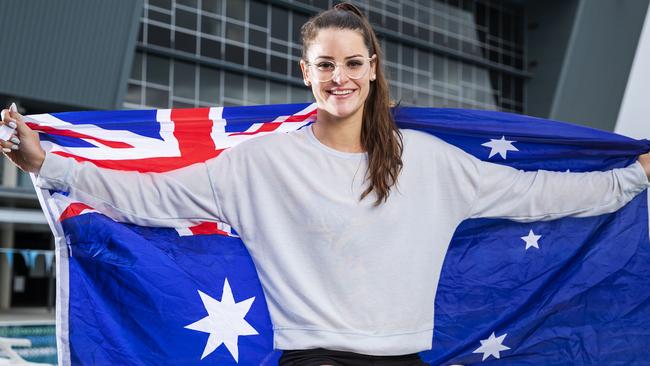
Taylor said McKeown made the decision after consulting with her personal coach Chris Mooney based on the schedule.
While she broke the 100m backstroke world record at the Australian trials last month, she faces stiff competition winning the gold in Tokyo because her main rivals are all close to her best time, including the previous record holder Regan Smith.
The women’s 100m backstroke is held over three sessions, with nighttime heats on Sunday July 25, followed by lunch time semi-finals on Monday July 26 and a midday final on Tuesday July 27.
The concern is that the heats of the 200m medley are on the evening of July 26, when she could be back at the village resting, so the decision was made to pull out altogether.
“It’ll be a late night because of the late heats, so she will potentially lose sleep and the 100m back is a tight event,” Taylor said.
“There’s some quality athletes in that 100m back and I think they just want to make sure she’s sharp and at her best. I wouldn’t think any of the other 100m backstrokers would be swimming that night. They’d be back in the village resting.”
While her withdrawal is a blow to Australia’s medals hopes in the pool, with no one else down to swim the event - Taylor said he understood and accepted the decision.
McKeown is one of Australia’s best young swimmers but is competing at the Olympics for the first time and is still grieving the loss of her father, who passed away last year.
No Australian woman has ever won a gold medal in backstroke at the Olympics and with the medley and mixed medley relays, she will still compete in up to four events.
“I leave these decisions up to the head coach of the athlete and the athlete themselves, and they have to be confident that that’s what they’ll be able to do,” Taylor said.
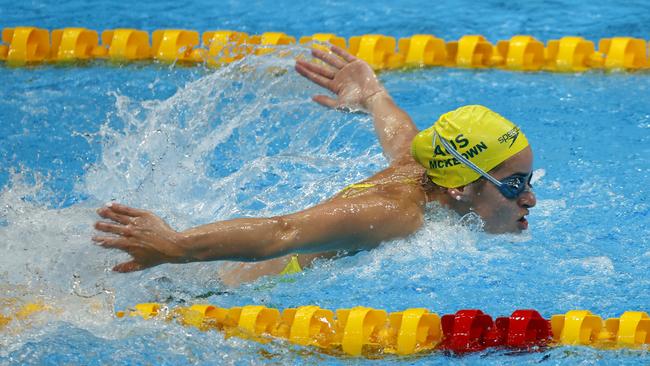
“She’s never done it before so it’s new to her. And I think emotionally, we need to respect that.
“That’s something she’s not familiar with but in the future, we need to make sure she’s familiar with it because she is such a weapon in so many different events. So right now, that’s the call that’s been made.”
McKeown has made headlines through the build up to the Games most recently for the tattoo on her foot that says “I’ll always be with you” in honour of her father who died from cancer last year, and something she says she’ll be using it as inspiration in the Tokyo pool.
Her shock withdrawal opens the door to Americans Madisyn Cox and Alex Walsh, who were shaping as her major medal threats.




